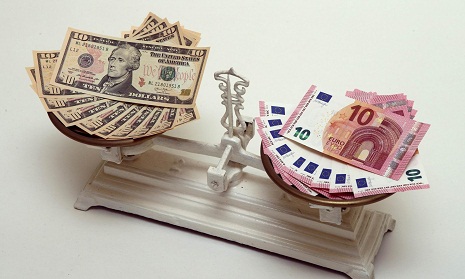Euro sinks to 12-year low in value against the dollar

Ewald Nowotny, the head of Austria’s central bank and a member of the ECB’s governing council, said the ECB did not target the exchange rate. “The ECB, as a central bank, does not have the exchange rate as a policy. It is a side effect of other things.”
He added: “Exchange rates are not a major dominant factor for the global economy. I think it would be wrong right now to assume that what’s going on is a currency war.”
The euro lost more than 1% against the dollar on Wednesday in what one analyst called the “most rapid and protracted” fall in the euro against the dollar since the single currency was founded in 1999. Meanwhile, the dollar extended its gains and has now risen by more than 10% against a basket of the world’s major currencies – including the euro, the British pound and the Japanese yen – since the start of 2015. It is on course for its strongest quarterly performance since 1992. Although sterling is trading above €1.40 against the euro – its highest level since 2007 – it fell below $1.50 against the dollar to its lowest level in 20 months.
Three factors have combined to send the euro down by more than 1% against the dollar to $1.0540: the likelihood of an increase in US interest rates; the deepening crisis in Greece; and the effect of the ECB’s quantitative easing programme, launched this month.
Despite the fall in the euro to a fresh 12-year low against the dollar, Mario Draghi, the ECB’s president, said the beneficial effects of QE were already evident, with contagion effects from Greece contained. An upbeat Draghi told a conference in Frankfurt that the eurozone economy was on the mend and hailed the effect of quantitative easing.
“We saw a further fall in the sovereign yields of Portugal and other formerly distressed countries in spite of the renewed Greek crisis,” he said.
“This suggests that the asset purchase programme may be shielding euro area countries from contagion. We are aware that our measure may entail some financial stability risks but currently these risks are contained.”
Draghi said the slowdown in eurozone growth had reversed and that economic recovery would broaden and “hopefully strengthen”.
Currency dealers said the depreciation of the euro and the appreciation of the dollar were attributable to ECB and the US Federal Reserve following divergent strategies. The Fed is expected to start raising interest rates within the next three months while the ECB will continue its €60bn-a-month bond-buying programme.
The ECB’s quantitative easing programme is driving down the interest rates that eurozone governments have to pay on the money they borrow. Italy and Spain’s 30-year borrowing costs fell below 2% yesterday while the interest rate on 30-year German bonds was lower than the rate on two-year US Treasury bonds.
Prospects for eurozone exporters have been boosted by the euro’s decline against the dollar. Michael Hewson, of CMC Markets, said that 10 months ago the euro was close to $1.40 against the dollar and was trading at almost $1.25 as recently as December.
“For now, the euro looks to be headed towards parity. The next target sits at $1.0500 (the March 2003 lows) and it remains a very short hop from there to parity,” Hewson said.
Jonathan Loynes, chief European economist at Capital Economics, said he had “pencilled in a further fall in the euro to parity against the dollar in the next few months, and it could certainly go lower”.
“However, we then anticipate a partial recovery in the single currency to about $1.10 by the end of 2016 as the Greek crisis is resolved one way or another and the eurozone’s relative growth performance improves a bit,” he said.
Capital Economics estimated the probability of Greece leaving the euro was greater than 50%. “The precise timing is uncertain, but Greece’s current economic and financial position is unsustainable and, after the initial turmoil, the country would be much better off outside. This suggests that the risks to the euro versus the dollar are still on the downside, as a resurgence of the crisis would add to the pressure from the divergence in monetary policy.”















































